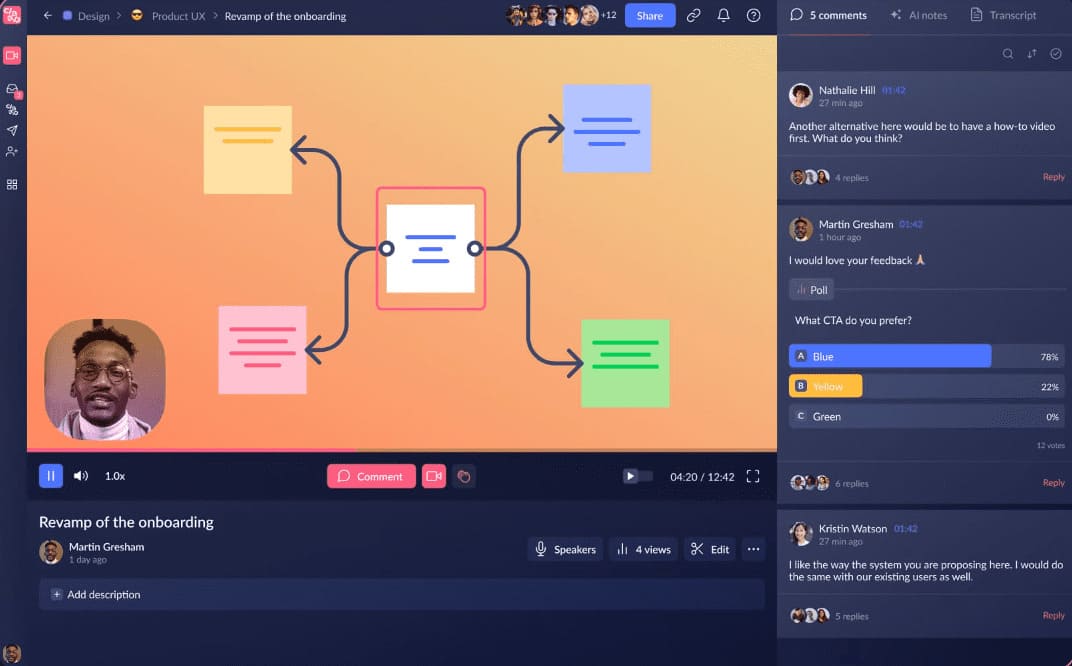What is an Objection Handling?

In the sales environment, an objection is a statement made by a prospect indicating they have reservations or doubts about the product or service you’re trying to sell. Here are the main kinds of objections your prospect could make:
- Price Objection: The prospect has budget constraints, or simply doesn’t want to pay the price you ask.
- Value Objection: The prospect is unsure about the value your product will bring to their company and/or how it could solve their problems.
- Need Objection: The prospect feels like they don’t need the product at the moment.
- Trust Objection: The prospect doesn’t trust you or your company.
- Timing Objection: The prospect doesn’t view your product as a priority and doesn’t see the benefits of buying it now.
- Product Fit Objection: The prospect is unsure about the fit between the product you offer and the specificities of their company.
- Competitor Objection: The prospect isn’t convinced that your product is better than the competition.
Objection handling is a strategy you (if you’re a salesperson) need to define to respond to the concerns raised by your prospect and close the deal. In this guide, I’ll explain how to use ChatGPT to generate effective objection handling responses tailored to your company and the product you’re selling to help you prepare for any objection raised by your prospects.
How do I Use ChatGPT?
Using ChatGPT to craft effective cold call scripts is straightforward. Here’s a step-by-step guide on how to access and utilize this powerful tool:
- Access ChatGPT: First, visit the OpenAI website or the platform that hosts the ChatGPT application. You will need to create an account if you haven’t already done so.

- Start a New Session: Once logged in, look for an option to start a new chat or session. This is where you’ll input your prompts.

- Input Your Prompts: Think about what you want to achieve with your cold call. What are the key points you need to cover? Type these into ChatGPT as prompts. For example, you might enter “introduction for a cold call about a new financial planning service” or “how to ask about current suppliers in a cold call.” Or use one of the prompts in the section below.

- Generate Scripts: After inputting your prompt, ChatGPT will process the information and generate a text based on your requirements. This text will be formulated to engage and interest the type of customer you are targeting.
- Refine the Script: Once you have the initial script, you can refine it to better suit your voice or the specific needs of your campaign. You might want to tweak the language, add personal touches, or adjust the call to action.
- Practice and Implement: Practice the script to ensure it sounds natural when you deliver it. Then, use it in your actual cold calls to see how it performs with real customers.
By following these steps, you can use ChatGPT to create personalized, effective cold call scripts that are designed to convert leads into customers.
What Makes a Good Objection Handling Strategy?

- Listen actively: Understanding your prospect’s objections is key for effective objection handling. That’s why I recommend listening attentively to your prospect before saying anything.
- Show empathy and understanding: Showing empathy towards your prospect's concerns make them feel considered and comfortable. It’ll make the objection handling easier on your side.
- Be well-prepared: Knowing your product inside out is crucial for objection handling. Being an expert on all your product’s features enables you to respond confidently and address the main objections easily.
- Have a clear speech: Articulating responses clearly and persuasively helps in conveying the value and benefits of your product or service in addressing the prospect's needs or concerns.
- Tailor responses: This one looks obvious but is not less important. Customizing responses to align with the prospect’s specific situation makes your objection handling way more impactful than having a ready-made speech.
- Anticipate objections: Anticipating objections before your prospect even raises them is a highly effective practice that makes your interlocutor feel confident about your product.
- Provide evidence: Backing up your claims with examples and testimonials reinforces credibility and helps you build trust with the prospect.
- Suggest next steps and call to action: Concluding objection handling with a clear call to action or next steps, such as scheduling a demo or setting up a follow-up meeting, helps you keep the discussion going and increase your chances of closing the deal.
7 Best Prompts for Objection Handling in Sales: Be Prepared for any Objection

Price Objection
Generate an objection handling script for a salesperson named [Salesperson Name] in the [Industry] industry. The script should start with acknowledging the customer's concern about the price of [Product/Service Name]. Reassure the customer about the value and benefits of the product/service. Highlight a specific feature or advantage that justifies the price. Provide a comparison with competitors or alternative solutions to demonstrate cost-effectiveness or superior value. Offer a flexible payment plan or financing option if applicable. Close by summarizing the overall value proposition and asking if the customer has any further questions or concerns.
Value Objection
Generate an objection handling script for a salesperson named [Salesperson Name] in the [Industry] industry. The script should start with empathizing with the prospect's concern about the perceived value of [Product/Service Name]. Introduce or reiterate the key benefits and unique features of the product/service. Provide specific examples or case studies of how similar customers have successfully used the product/service to solve similar problems or achieve specific goals. Offer a trial or pilot program if feasible, allowing the prospect to experience the value firsthand. If applicable, provide metrics or ROI calculations to demonstrate the potential return on investment. Close by summarizing the overall value proposition and asking if the prospect sees how [Product/Service Name] can address their specific challenges or goals.
Need Objection
Generate an objection handling script for a salesperson named [Salesperson Name] in the [Industry] industry. The script should start with understanding and acknowledging the prospect's current perspective that they may not perceive an immediate need for [Product/Service Name]. Shift the focus to uncovering potential pain points or challenges that the prospect may not have considered or may be unaware of. Share insights or industry trends that highlight why addressing these challenges now can be beneficial. Provide examples of how other similar companies have benefited from adopting [Product/Service Name]. Offer a personalized solution or recommendation based on the prospect's specific situation or goals. If applicable, suggest a low-risk trial or pilot program to demonstrate the potential value without a long-term commitment. Close by summarizing the potential benefits of addressing their challenges now and ask if they would be open to exploring how [Product/Service Name] could help them achieve their objectives

Trust Objection
Generate an objection handling script for a salesperson named [Salesperson Name] in the [Industry] industry. The script should start by acknowledging the prospect's concern about trust in [Salesperson Name] or the company. Reassure the prospect by highlighting the company's track record, years of experience, or customer testimonials that demonstrate reliability and customer satisfaction. Share any relevant certifications, awards, or industry recognitions that establish credibility. Offer to connect the prospect with references or case studies of satisfied customers who can vouch for the product/service and the company's integrity. Address any specific concerns the prospect may have and provide transparent and honest responses. If applicable, offer a satisfaction guarantee or a trial period to alleviate any concerns about risk. Close by reaffirming the commitment to customer satisfaction and asking if there are any additional questions or concerns that need to be addressed.
Timing Objection
Generate an objection handling script for a salesperson named [Salesperson Name] in the [Industry] industry. The script should start by empathizing with the prospect's viewpoint regarding the timing of purchasing [Product/Service Name]. Acknowledge that priorities can shift and timing is crucial. Shift the focus to discussing potential consequences of delaying the purchase, such as missed opportunities, increased costs, or continued challenges. Share relevant industry insights or trends that suggest why addressing their needs now could be beneficial. Provide examples or case studies of how timely adoption of [Product/Service Name] has helped similar companies achieve significant results. Offer a solution that aligns with the prospect's timeline, such as a phased implementation plan or flexible contract terms. If applicable, suggest incentives or limited-time offers to encourage action without pressure. Close by summarizing the potential benefits of acting now and asking if they would be open to exploring how [Product/Service Name] could address their current needs or goals.
Product Fit Objection
Generate an objection handling script for a salesperson named [Salesperson Name] in the [Industry] industry. The script should start by empathizing with the prospect's concern about the fit between [Product/Service Name] and their specific company needs. Ask clarifying questions to understand their specific requirements, challenges, and goals in detail. Highlight the flexibility and customization options of [Product/Service Name] that can be tailored to meet their unique needs. Provide examples or case studies of how similar companies with similar challenges have successfully used [Product/Service Name] to achieve their objectives. Offer a personalized demonstration or trial that showcases how [Product/Service Name] can specifically address their pain points and deliver value. If applicable, suggest additional features or integrations that can further customize the solution to fit their requirements. Close by summarizing the alignment between their needs and the capabilities of [Product/Service Name], and ask if they can see how it can effectively support their goals.
Competitor Objection
Generate an objection handling script for a salesperson named [Salesperson Name] in the [Industry] industry. The script should start by acknowledging the prospect's consideration of competitive options and their desire to ensure they make the best choice. Differentiate [Product/Service Name] by highlighting its unique features, advantages, or benefits that set it apart from competitors. Provide specific examples or case studies that demonstrate how [Product/Service Name] has outperformed competitors or solved similar challenges more effectively. Address any specific concerns or comparisons the prospect may have raised about competitors and provide factual responses or comparisons. Offer a direct comparison of key features, pricing, or customer satisfaction metrics where [Product/Service Name] excels. If applicable, emphasize the company's reputation, customer service, or additional support offerings that differentiate it from competitors. Close by summarizing why [Product/Service Name] is the superior choice and ask if they have any further questions or concerns about how it compares to competitors.
Discover Claap and boost your closing rate by 50%

Claap is an audio and video transcription tool, and a meeting recorder. But it’s not only that.

In short, Claap is an amazing tool for a sales team. If you’re not convinced yet, you can test Claap’s features for free for 14 days. Start now, and see the difference ! (Free plan with no credit card required)






